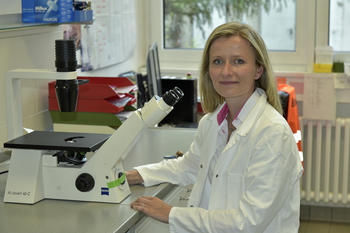It’s Not Just the Genes
Pharmacologist Sarah Hedtrich studies the causes of atopic dermatitis and has just won an award for her work.
Sep 12, 2016
Junior professor Sarah Hedtrich studies the causes of atopic dermatitis at the Institute of Pharmacy at Freie Universität.
Image Credit: Manuel Krane
Atopic dermatitis is a disease that is difficult to study because it has many different causes and not all of them are known. There is no way to prevent the disease, and very little clarity has been achieved to date regarding its mechanisms. But Sarah Hedtrich, a junior professor with a doctorate in pharmacology, could help to change that soon: She has been able to show that genetic causes play less of a role in the emergence of atopic dermatitis than had previously been believed. Hedtrich has received the “Research On Skin-Dryness Award” (R.O.S.A.) for her research.
Atopic dermatitis is a chronic skin disease involving regular eczema inflammation and severe itching. It was first studied extensively in the 19th century, when physicians believed it was a nervous condition. That is the source of another name for the disease, which is still common today: “neurodermatitis” (from the Greek word for “nerve”). These days, scientists prefer the term “atopic dermatitis.”
Medications bring some relief to sufferers, but so far, the disease itself has proved to be incurable. “The reason is that it is a very complex disease, with multiple contributing factors,” Hedtrich explains. “Any group of researchers can actually only look at one aspect,” she adds.
Genetic Defect Less Important than Previously Believed
However, there are multiple theories that attempt to explain the origins of atopic dermatitis among researchers. Up to half of all atopic dermatitis sufferers have a defect in the “filaggrin” gene. This deficiency is currently viewed as a major risk factor for developing the skin disease.
In an earlier research project, Hedtrich had already found out that the filaggrin gene was likely to play less of a role than had previously been believed in the unusually high pH values found in many atopic dermatitis patients’ skin. Another aspect, and one that has received less attention to date, is how this genetic defect interacts with the patient’s immune system, which is constantly forming and releasing neurotransmitters that promote inflammatory response.
New studies have now shown that the role of the filaggrin gene in atopic dermatitis is more complex than had previously been suspected. As the gene interacts with neurotransmitters formed by immune cells that promote an inflammatory response, classic features of atopic dermatitis emerge. These take a more severe form in disease sufferers who have the defect than in those without it. This means that changes in the filaggrin gene do cause greater sensitivity to stimuli that promote inflammation. For these studies, Hedtrich worked with skin models in which the filaggrin gene had been deactivated. The models then received a supply of neurotransmitters that promote inflammation. Thanks to Hedtrich’s findings, research in this field could focus more on interaction between genetic and immunological factors in the future.
No Animal Testing
Hedtrich is proud to have received the R.O.S.A. prize. “I’m delighted, since it is a way of recognizing our research activities,” she says. She is especially proud that this award has gone to a research project that used no animal testing at all, working with artificially generated skin instead. “Even just a few years ago, artificial organs were viewed in the research sector as being rudimentary systems,” Hedtrich says. And yet, she explains, her research project in particular would not have been possible using animal subjects in the first place.
“In our models, we were able to completely eliminate the immune system as a factor, something that would obviously be impossible in living subjects,” she explains. “Simple artificial organs are better systems in terms of certain research aspects,” Hedtrich says, explaining that nearly 80 percent of the medications previously tested on animals have either no effect or unexpected side effects in human patients. “If there is any doubt, the effect that has been shown always applies only to the animals,” she explains. “After all, a mouse just isn’t a 70-kilogram person.”
Further Information
Prof. Dr. Sarah Hedtrich, Department of Biology, Chemistry, Pharmacy, Freie Universität Berlin, Tel.: +49 30 838-55065, Email: sarah.hedtrich@fu-berlin.de

